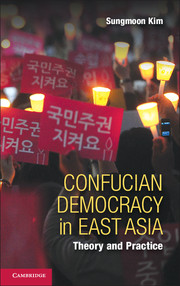Book contents
- Frontmatter
- Dedication
- Contents
- Acknowledgments
- Introduction
- Part I Beyond Thick Confucian Communitarianism and Meritocratic Elitism
- Part II Confucian Democracy in Theory – A Pluralist Reconstruction
- 4 Value Pluralism and Confucian Democratic Civil Society
- 5 Confucian Familialism and Public Reasoning
- 6 In Defense of Confucian Democratic Welfarism
- 7 Rethinking Political Meritocracy: Selection Plus Two
- Part III Confucian Democracy in Practice – The Korean Case
- Bibliography
- Index
- References
5 - Confucian Familialism and Public Reasoning
Published online by Cambridge University Press: 05 June 2014
- Frontmatter
- Dedication
- Contents
- Acknowledgments
- Introduction
- Part I Beyond Thick Confucian Communitarianism and Meritocratic Elitism
- Part II Confucian Democracy in Theory – A Pluralist Reconstruction
- 4 Value Pluralism and Confucian Democratic Civil Society
- 5 Confucian Familialism and Public Reasoning
- 6 In Defense of Confucian Democratic Welfarism
- 7 Rethinking Political Meritocracy: Selection Plus Two
- Part III Confucian Democracy in Practice – The Korean Case
- Bibliography
- Index
- References
Summary
In Chapter 4, I argued that for Confucian democracy to be socially meaningful and politically practicable in increasingly pluralizing East Asian societies, both Confucianism and democracy must undergo dialectical transformations and constrain each other, thus creating the societal condition favorable for it. What was central to my argument was that as long as we understand Confucian democracy as a democracy operating on Confucian habits and mores that broadly constitute Confucian public reason, Confucian virtues must be differentiated into moral virtues concerned with a person’s moral well-being qua human being and civic virtues related to the polity’s public character and its reproduction and that only the latter should be relevant to the general public. I differentiated Confucian public reason from its liberal counterpart of the kind advocated by deontological liberals in terms of a freestanding conception of justice completely separate from the “background culture” in civil society, and argued that such an understanding of public reason as solely concerned with the standard for appraising the legitimacy of basic structures is too narrow to apply to a Confucian pluralist democratic society in which public reason (more accurately public reasons) derives from the background culture or the culture of civil society. In the Confucian democracy that I propose, public reason is more than what is required of judges, legislators, governmental officials, or the candidates for public office who are concerned with the constitutional essentials of the regime or who are dealing with basic constitutional structure in the (formal) public political forum. More important, public reason is what ordinary citizens appeal to in deliberating political questions and public policies in the public space of democratic civil society.
- Type
- Chapter
- Information
- Confucian Democracy in East AsiaTheory and Practice, pp. 128 - 153Publisher: Cambridge University PressPrint publication year: 2014



